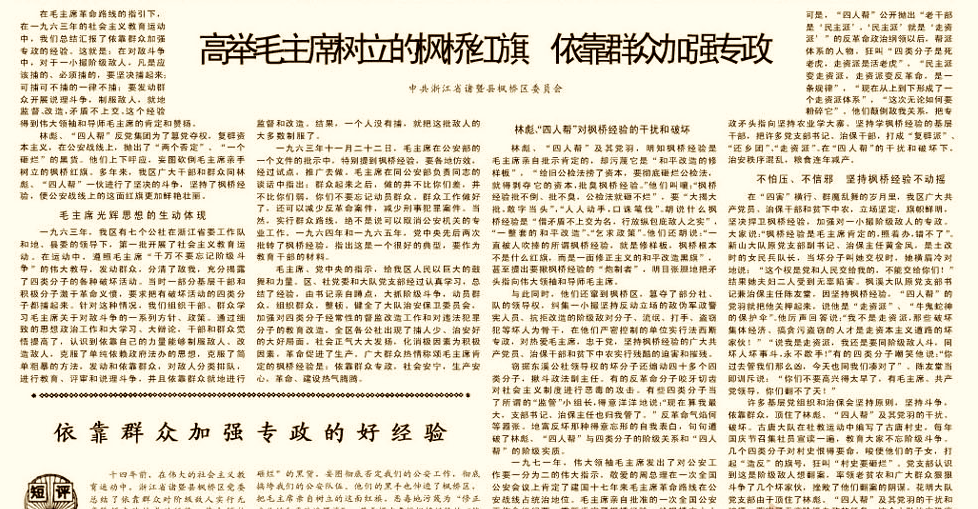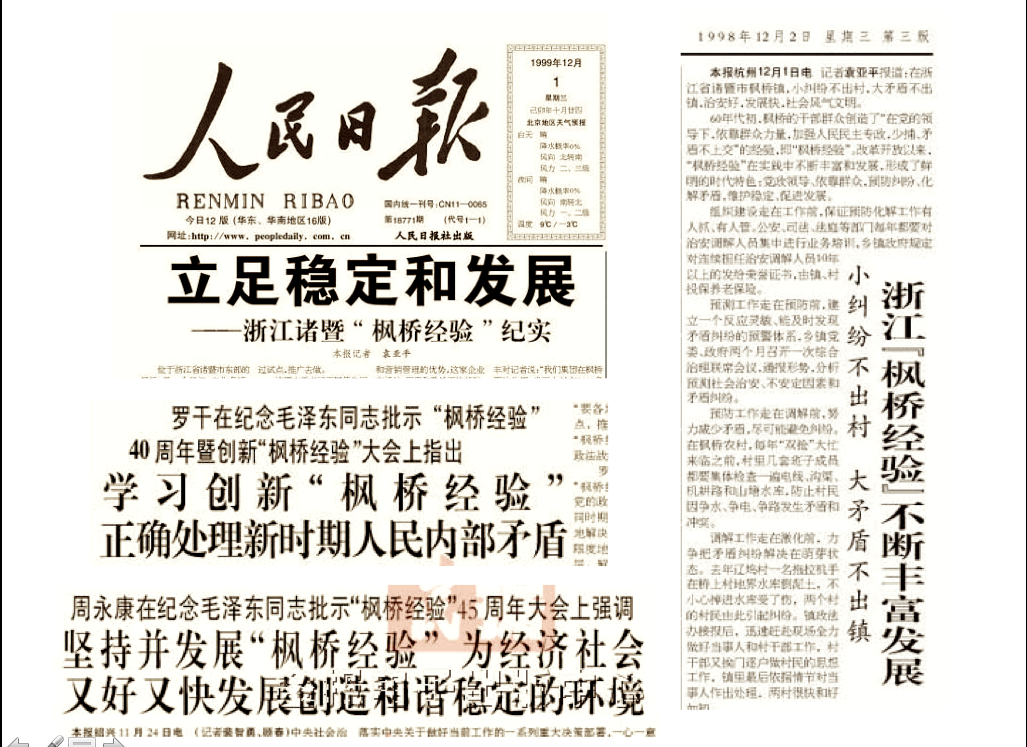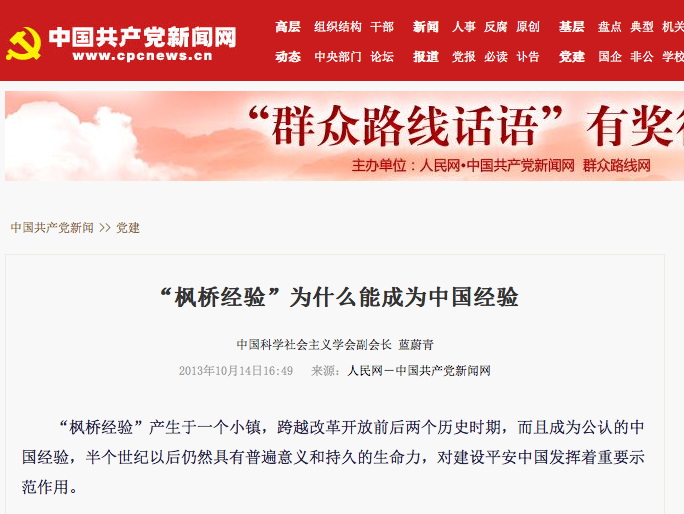China’s top leadership has recently commemorated the 50th anniversary of something few people have probably heard of — the “Fengqiao experience.” Ring any bells?
Almost certainly not, because this is what I would call a “cold term” (冷词), a Chinese Communist Party buzzword that has long fallen out of use and favor owing to its association with the Mao era. That has all changed in recent days.
The fanning to life of this Mao-era term is a lamentable surprise, the latest reminder of those chilly winds that have lately been blowing so strongly from the left, particularly as we near the 120th anniversary on December 26 of Mao Zedong’s birth.
What is the “Fengqiao experience”?
This “Fengqiao” does not refer to the Maple Bridge of Tang dynasty verse. Fengqiao, literally “Maple Bridge,” is a township in the city of Zhuji (诸暨市) in China’s Zhejiang province. Fifty years ago, Zhuji was a county, and Fengqiao was a district of that county.
There are two chief points of background to understand. The first is that in 1962, during the Tenth Plenary Session of the 8th CCP Central Committee, Mao Zedong once again raised the prospect of “class struggle” (阶级斗争). It was at that meeting, in fact, that Xi Zhongxun (习仲勋), the father of current president Xi Jinping, was purged after being falsely charged with leading an anti-Party clique.
The second point is that it was in 1963 that Mao Zedong launched his Socialist Education Movement (社会主义教育运动), also known as the Four Cleanups Movement (四清运动). This was essentially a ploy to root out elements within the Party that Mao regarded as “reactionary.”
Here is how the top Party leader of Fengqiao District reflected back on the Four Cleanups in the official People’s Daily fourteen years later, on December 21, 1977:
In 1963, the seven communes in my district, under the leadership of the work team of the provincial Party committee of Zhejiang and the prefectural and county leaderships, carried out the first group of socialist education campaigns. During this movement, complying with Mao’s great injunction to “never forget the class struggle,” the masses were mobilized, enemies and friends distinguished, and four types of destructive activities perpetrated by reactionary elements (四类分子) were thoroughly exposed. At that time, some grassroots cadres and activists, full of revolutionary fervor, demanded that all reactionary elements involved in destructive activities be rounded up. Faced with this situation, we organized cadres and the masses to study a series of Mao’s guidelines and policies on struggling against the enemy. Through detailed ideological and political work, and a massive campaign of study and debate, awareness was substantially raised among cadres and the masses, who recognized that by relying on their own strength they could deal with an rehabilitate the enemy. This overcame the simple reliance . . . upon violent methods, relying instead on the masses classifying and listing the enemy, carrying out struggle through education, review and explanation, and relying also on the masses carrying out monitoring and rehabilitation locally. As a result, not one person was rounded up, and still the vast majority of enemies were dealt with.

These so-called “reactionary elements,” or silei fenzi (四类分子), referred to landlords, wealthy peasants, counterrevolutionaries and evildoers (坏分子). A subsequent investigation, done after the end of the Cultural Revolution and printed in the February 5, 1979, edition of the People’s Daily, showed that the population of Fengqiao was 130,000, of which some 3,000 had been identified as “reactionary elements.” That means that 1 in 50 people in Fengqiao were regarded as “enemies.” The persecution of people like this across the country was part of the awful political landscape of that era.
In 1963, the work team of the provincial Party committee of Zhejiang summarized the methods employed in Fengqiao in a document called, “Experiences in Struggling Against the Enemy During the Socialist Education Movement in Fengqiao District, Zhuji County” (诸暨县枫桥区社会主义教育运动中开展对敌斗争的经验). During the National People’s Congress in 1963, the minister of public security, Xie Fuzhi (谢富治), gave a speech called, “Relying on the Strength of the Masses, Strengthening the People’s Democratic Dictatorship, Transforming the Majority of ‘Reactionary Elements’ into New People” (依靠群众力量,加强人民民主专政,把绝大多数“四类分子”改造成新人). Xie’s speech made specific mention of the example provided by Fengqiao.
Then, on November 20, 1963, Mao Zedong added his written instructions to the Xie Fuzhi speech, in which he said: “The example of Zhuji raised here is a good one — various regions should follow this example, expanding the work through pilot programs.”
On November 22, when Mao Zedong spoke with the deputy minister of public security, Wang Dongxing (汪东兴), he said: “Of all the work carried out by the ministry of public security, the most important was the question of how to work among the masses, how to educate and organize them so that they can take part in the general work of public security. Judging from the experience of Zhuji, once the masses have risen, they can do things as well as you and as strong as you. You must not forget to mobilize the masses.” (NOTE: The implication here is that public security officials should not focus on simply arresting “reactionary elements,” but must organize the masses to “reeducate” and reform them.)
Before the Cultural Revolution, the ministry of public security released materials about Fengqiao, but the People’s Daily never reported on these. On December 21, 1977, the People’s Daily published the piece from the top Party leader of Fengqiao District quoted above. That piece was called, “Raising High the Red Flag of Fengqiao Erected by Mao Zedong, Relying on the Masses to Strengthen Dictatorship” (高举毛主席树立的枫桥红旗 依靠群众加强专政). It was the first introduction to what would be called the “Fengqiao experience,” or fengqiao jingyan (枫桥经验):
In the struggle against the enemy, arrest is necessary and proper for a small number of class enemies; as for those you can choose to arrest or not, none should be arrested; you must mobilize the masses to carry out a struggle of reason, to deal with the enemies, carrying out on-site monitoring and rehabilitation, without the need to submit issues to higher authorities. This experience was affirmed and praised by the greater leader and teacher Mao Zedong.
On September 5, 1978, the People’s Daily published an official editorial called, “Rectifying and Strengthening Public Security Work” (整顿和加强社会治安工作). It talked about how “Fengqiao District in Zhejiang’s Zhuji County relied on the masses to carry out on-site rectification of reactionary elements, reforming the vast majority of them into self-supporting laborers for the law.” “Their successful experience,” the article said, “was praised by Mao Zedong, and was known as a red flag on the front lines of public security.”
What is the “Fengqiao experience”? That’s it. And now, half a century later, it is being remembered in China with highest honors.
Vanishing and Reemerging
The People’s Daily is our weathervane for judging political affairs in China. Its discourse is strictly regulated by the system of public opinion guidance (舆论导向). The Party leadership, in other words, chooses its words carefully, and the language we see in the People’s Daily is to a large extent reflective of prevailing consensus.
There was not one mention of the “Fengqiao experience” in the People’s Daily throughout the 1980s. This was the era of Deng Xiaoping, and while Deng had said that the Party would “continue to uphold Mao Zedong Thought,” it was he who led the entire CCP in criticizing the errors of Mao Zedong. In 1981, the CCP passed its Resolution on Certain Questions in the History of Our Party since the Founding of the Republic, which rejected the Socialist Education Movement.
On May 2, 1991, the People’s Daily published a report that praised Fengqiao for having “relied on the masses to preserve social stability.” But it made no mention of the 1963 example provided by Fengqiao.
Over this period — from 1980 through to the end of the 1990s — we passed the 20th, 25th, 30th and 25th anniversaries of Mao Zedong’s written instructions on the “Fengqiao experience” in 1983, 1988, 1993 and 1998 respectively, and in none of these cases was the date commemorated.
The first reappearance of the “Fengqiao experience” in the People’s Daily was on December 2, 1998.
On December 1, 1999, the People’s Daily published an article called, “Establishing Stability and Development: A Record of the ‘Fengqiao Experience’ in Zhejiang’s Zhuji” (立足稳定和发展——浙江诸暨“枫桥经验”纪实). The piece included the words of the current Party secretary of the city of Zhuji, in which he called “reliance on the masses, dissolving tensions and preserving stability” as the “Fengqiao experience” of the new era.
In the People’s Daily there are plenty of superficial references to the “Fengqiao experience.” But in the 14 years from 1999 to 2012, there are just 49 articles with the term “Fengqiao experience” in the People’s Daily (10 in the headline). Of these, four pieces appeared in 1999, two in 2000. There were no pieces using the term in 2001 or 2002. The rest of the articles using the term, 43 in all, appeared during the Hu Jintao era.

After Hu Jintao came to power, China entered what has been called the “age of stability preservation” (维稳时代). In 2003, the 40th anniversary of Mao Zedong’s written instructions on the “Fengqiao experience” was commemorated. At a ceremony in Zhejiang province, Central Committee member Luo Gan (罗干) said of the “Fengqiao experience”: “Dealing onsite with the resolution of tensions can enable to the greatest possible extent the resolution of conflicts at the grassroots [local] level, [so that problems are] resolved locally, resolved when they are still at an early stage” (People’s Daily, November 27, 2003, page 1).
In November 2008, during commemorations of the 45th anniversary of Mao Zedong’s written instructions on the “Fengqiao experience,” the hues of stability preservation were even deeper. Security chief Zhou Yongkang (周永康) said during the commemoration event, held again in Zhejiang, that “Party and government leaders at various levels must earnestly fulfill their prime responsibility to preserve stability.” He urged leaders to “grab [problems at] the source, grab the roots [of tensions] and grab the foundation” (People’s Daily, November 25, 2008, page 1).
The reemergence of the “Fengqiao experience” and its rise in temperature had to do directly with the intensification of the regime of stability preservation in China. The “onsite rectification and monitoring” of 50 years earlier had transformed into a new stability preservation slogan, “resolving problems locally.” This “resolution” really meant local officials needed to prevent their local petitioners from reaching Beijing. The “problems,” in other words, had to be rounded up and locked into black jails.
Governing the Nation by Mao (以毛治国)?
Until recently, no top Chinese leader since Mao Zedong had ever been quoted publicly in the People’s Daily or other state media making remarks on the “Fengqiao experience.” Not Deng Xiaoping. Not Jiang Zemin. Not Hu Jintao. But now Xi Jinping has broken the mold with his “important instructions on the development of the ‘Fengqiao experience’.”
Now we have Party media emphasizing that “the vitality of the Fengqiao experience lies in its following of the mass line.”
The “Fengqiao experience” for which Mao Zedong issued written instructions in 1963 was only ever about — and could only have been about — the class struggle. It was not, and could not possibly have been, about (as we have seen in state media this week) “employing legal thinking and legal methods to resolve problems and tensions concerning the vital interests of the masses.” Mao Zedong’s mass line was about organizing the masses to control evildoers, in other words a kind of “mass dictatorship” (群众专政).
These ideas are poles apart from modern ideas of rule of law. How can they possibly be implemented in a present-day China that is at least ostensibly a “people-oriented” (以人为本), “harmonious society” (和谐社会)?
There is an old saying in China, that if you don’t see the larger trends clearly before you act, your actions will be misguided, regardless of whether those actions are firm or flexible.
China’s general trend today is clear. The Cultural Revolution ended 37 years ago. Reform and opening has gone on for 35 years now. We’ve had a market economy for 21 years now. We signed the International Covenant on Civil and Political Rights 15 years ago.
As a major nation on the international stage, with a market economy, there is no other way for China except to govern according to the Constitution. Without constitutionalism, without full and sound rule of law, without a healthy civil society, there can be no peace and stability. Right now, to drag out this experience from the era of class struggle, which is all about struggling with internal enemies — this is not just climbing trees to look for fish, it is playing with fire.
The most obvious signal we can read from this commemoration of the “Fengqiao experience” is that this is a new validation of Mao Zedong’s ideas about governing the nation. Mao Zedong’s legacy is in fact one of the Chinese Communist Party’s most damaging negative assets. Since the end of the Cultural Revolution, while Mao has been revered as a symbol — as the “God card” (神主牌) — his general course in governing the nation (class struggle, comprehensive dictatorship, the continuous revolution, the command economy, the people’s commune system of government, etcetera) has been rejected outright for 30 years. Both Jiang Zemin and Hu Jintao dreaded “the stain” of Mao (沾毛).
Who would dare, in this day and age, to “manage state affairs with Maoist ideas” (以毛治国)?
On October 14, People’s Daily Online published an article called, “Why the ‘Fengqiao Experience’ Can Become the China Experience.” The author of the piece was Lan Yuqing (蓝蔚青), the deputy director of the China Society for Scientific Socialism (中国科学社会主义学会). Lan wrote:
From the beginning, the “Fengqiao experience” dispensed with the idea of “class struggle as the key link,” and introduced the idea of governance according to law. Comrade Mao Zedong’s validation of the “Fengqiao experience,” and the central Party leadership’s endorsement of the “Fengqiao experience,” comes not only because it upholds the Party’s mass line, but also in order to resolve the problem of excessive violence and incarceration that come with the expansion of the class struggle.
What sort of logic is this?

Mao Zedong always gave priority to the “two hands of revolution” (革命的两手). In 1964, he severely criticized Liu Shaoqi (刘少奇) for being a “closet rightist” (形左实右) in the midst of the Socialist Education Movement. He said that “the focus of this movement is cleaning up those within the Party who are established capitalist roaders.” Was this really about “dispensing with the idea of class struggle” or encouraging “governance according to law”?
During the “first 30 years” of Party rule, there were all sorts of written instructions from Mao Zedong that tinkered with policy. Concerning the Great Leap Forward and the Great Famine, we could also choose to be selective about our history, overlooking the purge of Peng Dehuai. And we could focus instead on Mao Zedong’s six internal Party missives of 1959, in which he sought to address the errors of his own policies. Maybe there are documents we could use selectively to suggest Mao Zedong was in fact a counterrevolutionary?
Lan Yuqing’s article is strange indeed. After 1962, did Mao Zedong’s class struggle not result in indiscriminate death and incarceration? But Lan describes Mao as a champion of governance according to law, as having rejected the idea of “class struggle as the key link.” This is tantamount to suggesting that Mao wasn’t Mao, that Mao opposed Mao. What can we call this kind of logic but demented?
The serious danger of this advocacy of the “Fengqiao experience” lies in how it confutes the first 30 years of CCP rule and the last 30 years of CCP rule, in how it ignores the facts of history, disregards logic, and shoves aside the very real pain the public feels over the Mao era — particularly those who suffered directly during that period.
As we near the 120th anniversary of Mao Zedong’s birth, the rashness of this drum-beating in the state media sends a chill through the hearts of countless millions.






















